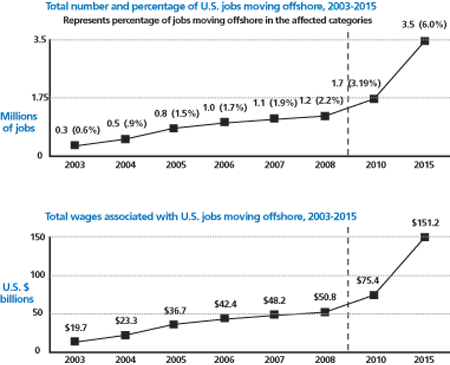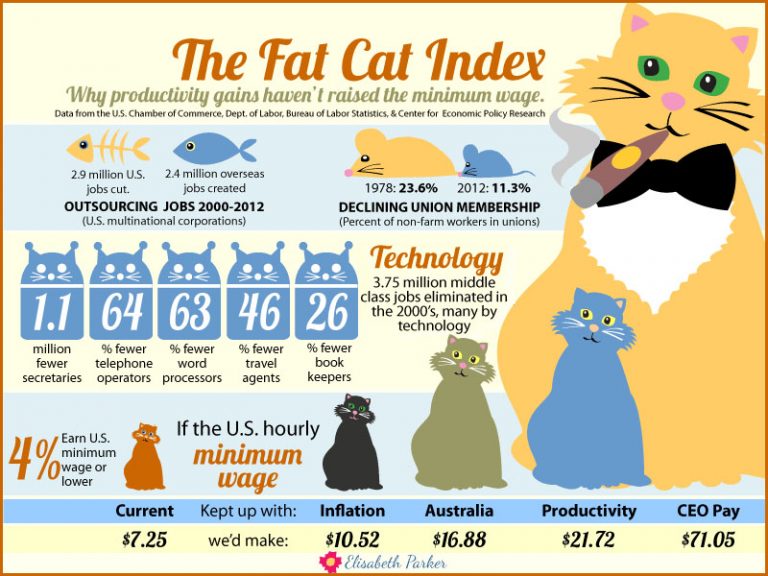.Continues from previous page.

U.S. jobs being outsourced overseas. Number and percentage of U.S. jobs being outsourced offshore (with figures and estimates for 2003-2015). Total wages associated with U.S. jobs being outsourced offshore. No wonder the federal minimum wage won’t budge. Graph from International Society of Automation’s InTech newsletter.
5. How outsourcing jobs overseas affects the federal minimum wage.
Next to greedy CEOs and their “greed is good” mentality, outsourcing is the main villain in our tale of declining wages. How can American workers — who take luxuries like a federal minimum wage and safe, child-free work environments for granted — compete against slave labor? In developing nations like China and Bangladesh, workers have few rights, and businesses are almost entirely unregulated. Why fork over big bucks to comply with environmental and safety laws, when you can find suppliers in countries free from these annoying inconveniences. No wonder China’s officially the most polluted nation , and the air quality in Beijing’s so toxic, it’s off the charts.
According to figures from the U.S. Chamber of Commerce, via Think Progress , U.S. corporations cut 2.9 million jobs over the past decade, and created 2.4 million overseas. The Wall Street Journal adds, “Thirty-five big U.S.-based multinational companies added jobs much faster than other U.S. employers in the past two years, but nearly three-fourths of those jobs were overseas.”
Better, faster, cheaper: Outsourcing overseas is here to stay.
The above graph comes from an article from the International Society of Automation. Its title gloats, “ Better, Faster, Cheaper: Outsourcing Overseas Is Here to Stay .” Which basically explains the outsourcing overseas issue in a nutshell. But how does outsourcing overseas lower the federal minimum wage, and American workers’ pay in general? By forcing Americans to compete against workers in countries with fewer regulations, fewer protections, and far lower standards of living.
Jim Pinto, founder of Action Instruments in San Diego, CA told the ISA:
“Why shouldn’t you have outsourcing? It’s a fact of life. It will hurt and help the economy.”
Now, we’re competing against workers who are starving? No wonder we’re broke.
So far, outsourcing seems to have only hurt the economy for most Americans. That could change if more Americans shared in the profits, but Wall Street’s masters of the universe are unlikely to ever let that happen. They won’t even let congress raise the federal minimum wage.
Pinto continues:
“Way back when I was investigating Japanese quality, I remember a guy asking me, ‘Have you starved? Have you ever been hungry? I have.’ It changes your attitude as a culture. You cannot simulate hunger. So when you’re competing with people who are hungrier than you are, you know who will win.”
Great, so big business wants American workers to compete against workers from developing nations who are starving? We should be raising the standard of living for our trading partners, not lowering our own standard of living. When corporate America devalues our labor, raising workers’ pay — starting with the federal minimum wage — becomes next-to-impossible. Especially with Republicans in Congress.
We can fight overseas outsourcing…
Sure, U.S. corporations have the right to see themselves as citizens of the world who can create jobs where they see fit. But if they’re unfairly penalizing actual citizens of the U.S. and hurting our economy, we have the right to revoke tax breaks and enact laws that make outsourcing less advantageous for them. In August, Rep. Timothy Bishop (D-NY) and a bipartisan group of congressmen introduced the US Call Center and Consumer Protection Act of 2013. The law would require full disclosure when call centers are moved overseas and disqualify the company from receiving federal loans for three years. As consumers, we can also stop buying outsourced goods and services.
But the best solution may ultimately lie in supporting our third world competitors. As they work their way out of poverty, they’ll start wanting better treatment, safer work conditions, and higher wages, too. In September, 2013 — following two factory disasters that killed over 1500 workers — over 200,000 Bangladeshi workers hit the streets of Dhaka, their capitol city, to demand a $100 per month minimum wage. This didn’t just happen out of the blue. Savvy women like 39-year-old Nazma Akhter — who’s worked in the garment industry since age 11 — are launching unions, and now they’re getting serious.
… While supporting unions in developing nations.
Akhter’s United Garment Workers’ Federation and other Bangladeshi unions are getting some serious support from their bigger brethren (or should we say “sistren?”), including the Industriall Global Union , which represents 50 million workers in 140 countries. There’s plenty of work to be done. If we support our unions, and unions in developing nations, overseas outsourcing won’t matter. Maybe someday, we can all have a better standard of living and work for people who care about our safety and treat us like human beings.
NEXT: By the numbers; 12 facts about the minimum wage.

